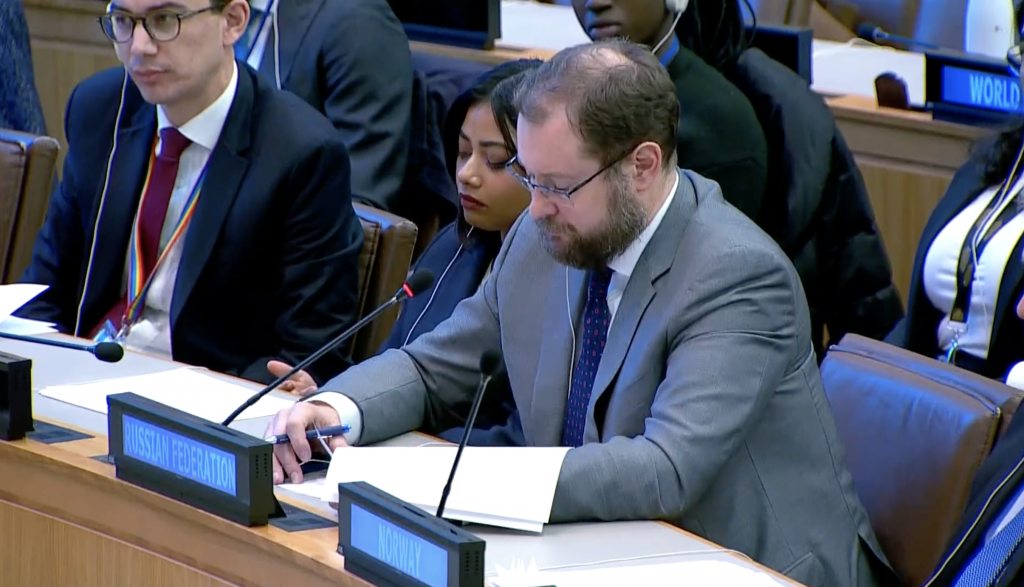Statement by Deputy Permanent Representative Dmitry Chumakov at an "Arria-formula" meeting of UNSC members "Transitioning from Protracted Conflict and Fragility into Peace Through Sustainable Development’’"
Mr.President,
We thank Kenya and Brazil for convening this meeting that is dedicated to prospects of conflict prevention and settlement through ensuring development.
We share the view that sustainable development cannot be achieved without peace and security, whereas in the absence of sustainable development, peace and security will also be threatened. Indeed, the activity of UN funds, programs, and special agencies can help to create prerequisites for sustaining peace if major principles of operative activities are observed. Those are universality, voluntary and gratuitous nature, neutrality, and multilateralism. Thereby the international cooperation in the area of peacebuilding needs to be focused on addressing the root causes of conflict in order to prevent recurrence of crisis. This support needs to be provided given full respect for sovereignty of the host state and the priorities and pressing needs of the society as specified by the host government. It is unacceptable for donors to proceed from their own preferences, and condition assistance on some political demands. This approach not only fails to facilitate peace, but can actually reverse the progress that has already been made.
As the Concept Note for this meeting rightly states, reduction of investment in development poses a serious threat. By UNCTAD data, back in 2015, extra 2.5 trillion dollars per year was needed to achieve Sustainable Development Goals. However by 2021 this figure grew by 70% (4.2. trillion dollars) as cited by OECD report. Unfortunately, there is every reason to assume that this difference will continue to grow. Foreign direct investment in the poorest states tends to decrease, whereas foreign development assistance (as we see in the case of major donors), is increasingly often diverted to serve conflicts or the needs of refugees.
Politicization of assistance and donors’ failure to deliver on their commitments is the reason why in the Security Council we more often come to speak about missed opportunities to promote peace through development. I will provide a few examples.
We repeatedly underscored that due to unilateral restrictions, imposed on Damascus by Western states, it was impossible to recover critical infrastructure in Syria, bring Syria back to the Arab family, and attract international financing. We also need to recall what role the UN Secretariat plays here. For several years on end, we have been working to have the Secretary-General revoke an absolutely immoral guide “Parameters and principles of UN Assistance in Syria”. This internal document of the Secretariat represents a clear violation by the UN leadership of their duties; to say nothing of the fact that it basically covers up for the politicized approaches of Western states to this country-specific situation.
Afghanistan is another tragic example. It is obvious that improvement of the external economic environment and effective partnerships could mitigate vulnerability of this country. However Afghanistan’s money remains frozen, and most donors refuse point blanc to proceed from humanitarian aid to financing projects for development.
We also see some worrisome trends in Africa. Aid that is initially pledged for financing of mechanisms for implementation of UNSC-endorsed peace agreements may be stopped, and its resumption may be conditioned on some political demands, to say nothing of widespread blackmail relating to assistance for development.
Colleagues,
The Peacebuilding Commission (PBC) plays an important role as both an intergovernmental advisory body on peacebuilding issues and a platform where member states can hear views of a wide range of invited participants on its agenda items. To a large extent, the Commission is the link ensuring connectivity of the peacebuilding activities and the UN development system. One of its tasks is to facilitate predictable financing of initial recovery activities and make sure that the international community continues to focus on countries in post-conflict situations. UNSC resolution 1645 stipulates that respective recommendations of the Commission for the period when countries go over from transitional recovery to development, will be especially relevant for ECOSOC, taking into account its role as a major body for coordination, review, discussion of policies, and elaboration of recommendations on issues of economic and social development.
We do regret however that this “developmental” track does not receive enough attention and therefore money, especially taking into account the existing inclination towards political, human rights and gender issues, governance-related and other secondary problems. We cannot fail to notice the underfinancing of such tracks as disarmament, demobilization, and reintegration, and security sector reform, though these are not directly related to development.
Colleagues,
Both in the Peacebuilding Commission, and in other bodies that address issues of development, we should be attentive to and responsive of the requests of countries dealing with conflicts, but without imposing on them any priorities from the outside. For example, we call to pay attention to such a key instrument of coordination of UN assistance as the United Nations Sustainable Development Cooperation Framework (UNSDF). Elaborated jointly with national governments, such frameworks direct the activities of bodies within the UN Development System in every given country situation at achievement of shared coordinated goals, and also make it possible to mobilize support of a wide range of partners from outside the UN.
Ensuring reliable and sufficient financing for development clearly stands at the core of the current UN agenda. Given the investment risks in post-conflict environments, it is advisable to rely primarily on multilateral mechanisms for concessional assistance and debt relief (loan deferrals, issuance of new loans under an accelerated preferential scheme), exclude politically-motivated decisions, attract state and mixed financing, make wider use of the potential of regional integration mechanisms, including regional development banks.
Thank you.
